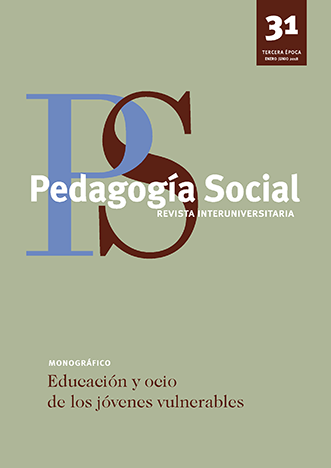Modelos de acción socioeducativa con infancia y adolescencia en los servicios sociales municipales de la CAV
Palabras clave:
Accion socioeducativa, modelos, dialogoResumen
Autor: Maria Aránzazu Remiro Barandiaran.
Directores/as: Dra. María José Alonso Olea. Dra.
Maite Arandia Loroño.
Departamento/Instituto: Universidad del País
Vasco/Euskal Herriko Unibertsitatea.
Fecha de defensa: 18 julio 2016.
Descargas
Citas
Agintzari, S. Coop. (2004). Kite. modelo operativo de gestión del programa de intervención socioeducativo. Bilbao: Diputación Foral de Bizkaia.
Ander-Egg, E. (1982). Metodología del trabajo social. Alicante. Instituto de Ciencias Sociales Aplicadas.
Ararteko. Defensoría Euskadi. (2006). Convivencia y conflictos en los centros educativos. informe extraordinario. Vitoria-Gasteiz.
ASEDES., y CGCEEES. (2007). Documentos profesionalizadores. Asociación Estatal De Educación Social.
Beck, U. (2008). Reinventar europa: Una visión cosmopolita. Quaderns De La Mediterrània, 10, 319-325.
Castel, R. (1998). Del postliberalismo al neoliberalismo. En neoliberalismo versus democracia pp. 404-416. Madrid: La Piqueta.
Cunningham, F. C., Ranmuthugala, G., Westbrook, J. I., y Braithwaite, J. (2012). Net benefits: Assessing the effectiveness of clinical networks in australia through qualitative methods. Implementation Science, 7, 108-117.
Denzin, N.K. y Lincoln, Y.S. (2000). The discipline and practice of qualitative research. En N. K. Denzin y Y. S. Lincoln (Eds.), Handbook of Qualitative Research (pp. 1-28). London: Sage Publications, pp. 1-28.
Freire, P. (1997). A la sombra de este árbol . Esplugues de Llobregat : El Roure
Hesse-Biber, S. (2012). Feminist approaches to triangulation: Uncovering subjugated knowledge and fostering social change in mixed methods research. Journal of Mixed Methods Research, 6, 137-160.
Includ-ed consortium (2009). Educational success in Europe. Bruselas: European Commission. Directorate General for Research
Jolonch, A. (2002). Educació i infància en risc: Acció i reflexió en l'àmbit social. Barcelona: Editorial Pòrtic.
McHugh, M., O'Brien, G., y Ramondt, J. (2001). Finding an alternative to bureaucratic models of organization in the public sector. Public Money y Management, 21(1), 35-42.
Miyata, H., y Kai, I. (2009). Reconsidering evaluation criteria for scientific adequacy in health care: An integrative framework of quantitative and qualitative criteria. International Journal of Cualitative Methods, 8(1), 66.
Song, J., y Wu, H. (2011). The english teaching model of cooperative learning in the network environment in higher vocational education. Advances in Computer Science, Environment, Ecoinformatics, and Education, 218, 100-104.
Yuste, M., Serrano, M. A., Girbés, S., y Arandia, M. (2014). Romantic love and gender violence: Clarifying misunderstandings through communicative organization of the research. . In Qualitative Inquiry, 20(7), 850-855.
Zay, D. (2011). A cooperative school model to promote intercultural dialogue between citizens-to-be. Policy Futures in Education, 9(1), 96-103.
Zeng Y., y Zhang L. (2012). Implementing a cooperative learning model in universities. Educational Studies, 38(2), 165-173.
Descargas
Publicado
Cómo citar
Número
Sección
Licencia
Derechos de autor 2018 Pedagogía Social. Revista Interuniversitaria

Esta obra está bajo una licencia internacional Creative Commons Atribución-NoComercial-CompartirIgual 4.0.
Derechos de reproducción y archivo
La versión publicada de los artículos podrá ser autoarchivada por sus autores en repositorios institucionales y temáticos de acceso abierto. No obstante la reutilización total o parcial de los mismos en nuevos trabajos o publicaciones deberá ser autorizada por Pedagogía Social. Revista Interuniversitaria.
Los trabajos publicados deberán ser citados incluyendo el título de la Revista, Pedagogía Social. Revista Interuniversitaria, nº, páginas y año de publicación.
Responsabilidades éticas
Pedagogía Social. Revista Interuniversitaria no acepta material publicado anteriormente en otros documentos. Los/as autores/as son responsables de obtener los permisos oportunos para reproducir parcialmente material de otras publicaciones y citar correctamente su procedencia. Estos permisos deben solicitarse tanto al autor/a como a la editorial que ha publicado dicho material.
Es obligación de Pedagogía Social. Revista Interuniversitaria detectar y denunciar prácticas fraudulentas.
En la lista de autores/as firmantes deben figurar únicamente aquellas personas que han contribuido intelectualmente al desarrollo del trabajo.
La revista espera que los/as autores/as declaren cualquier asociación comercial que pueda suponer un conflicto de intereses en conexión con el artículo remitido.
Los autores deben mencionar en el manuscrito, preferentemente en el apartado del método, que los procedimientos utilizados en los muestreos y controles han sido realizados tras la obtención de consentimiento informado.
La revista no utilizará ninguno de los trabajos recibidos con otro fin que no sea el de los objetivos descritos en estas normas.
Aviso de derechos de autor/a
© Pedagogía Social. Revista Interuniversitaria. Los originales publicados en las ediciones impresa y electrónica de esta Revista son propiedad del Pedagogía Social. Revista Interuniversitaria, siendo necesario citar la procedencia en cualquier reproducción parcial o total.
Salvo indicación contraria, todos los contenidos de la edición electrónica se distribuyen bajo una licencia de uso y distribución “Creative Commons Reconocimiento-No Comercial 3.0 España” (CC-by-nc). Puede consultar desde aquí la versión informativa y el texto legal de la licencia. Esta circunstancia ha de hacerse constar expresamente de esta forma cuando sea necesario.






